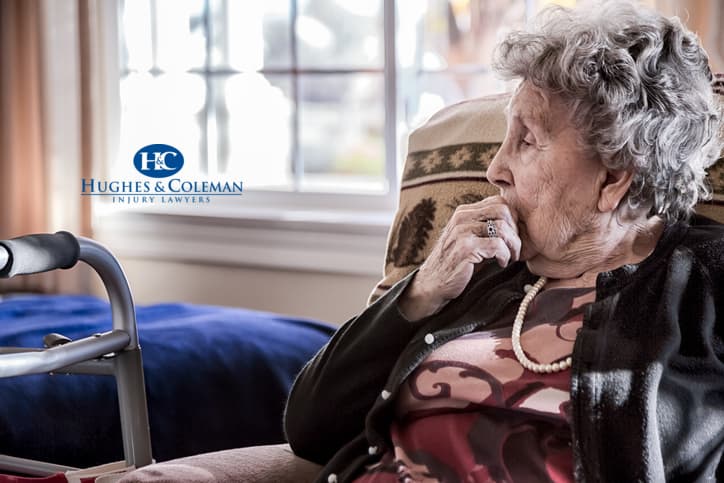-

In this article, we provide information that will help you to quickly recognize the signs of elder abuse and neglect and to react promptly, perhaps taking appropriate legal measures to protect your elderly loved one.
If you suspect a nursing home or long-term care facility of abuse or neglect, contact an experienced Lexington nursing home abuse lawyer today for a free consultation. Our legal team can help protect your loved one and help you to understand the legal options available.
Call today.
800-800-5600
Our team is available 24/7 and are here to help you through this time.
Learn to Recognize the Abuse
While you can minimize the risk by carefully choosing the right nursing home, abuse and neglect may at times occur even in the facilities with the best of reputations and an impeccable record. Being able to quickly recognize the signs of abuse and neglect will allow you to act promptly and protect your loved one from any unnecessary suffering. Be alert for the following signs.
Changes in Mood
Even if you don’t notice any visible signs of abuse or neglect, sudden and dramatic changes in your loved one’s personality or mood can be the first sign that things are not in order. Both physical and emotional abuse cause distress that may cause your loved one to act depressed, frightened or withdrawn. He or she may also complain about not sleeping or lose interest in the things previously enjoyed. While it may be easy to ascribe such behavioral changes to other factors, they should never be ignored or made light of as they might point to abuse or neglect.
Visible Injuries
Visible injuries usually point to either physical violence or extreme neglect. Some of the signs that your loved one may be suffering from one or the other may include:
- weight loss
- bed sores
- unexplained bruises or scars
- sprained or broken bones
- repeated injuries
Any of these visible signs should be especially concerning if a senior doesn’t want to offer an explanation for it or doesn’t want to see a doctor about it. Since the abused elderly are often threatened, your loved one may be afraid that they’ll suffer even more harm if they tell you about the suffering they’ve experienced. It is, then, important to be perceptive to notice any signs of physical abuse or neglect and act before your loved one suffers even more serious injuries or harm.
Unsanitary Conditions
If you have noticed a change in the state of the rooms, living spaces, and common areas, it may be a warning sign, telling you that the quality offered by the home has decreased. Of course, disorganized or cluttered spaces don’t necessarily point to abuse or neglect. However, unsanitary conditions, foul smells or trays of old food are unacceptable and may be one of the first warning signs that the health and safety of your loved one are at risk. Do not be afraid to speak up about anything that you may find troubling and bring it to the attention of a supervisor.
Legal Protection in Elder Abuse Cases
Extreme cases of physical and emotional abuse, as well as cases of sexual abuse, can be prosecuted under criminal law. However, even less severe instances of abuse, neglect, and negligence can be brought before the court as civil cases. If your elderly loved one suffered physical or emotional harm due to negligence on the part of a long-term care facility, your loved one may be able to receive financial compensation for the injuries. Common examples of nursing home negligence may include:
- Failure to keep the premises reasonably safe
- Failure to provide adequate medical treatment
- Incorrect administration of medicine
- Negligent supervision of residents
- Negligent staffing practices
If you suspect that your aging relative may be a victim of elder abuse or nursing home neglect, it is important to act as soon as possible. This is crucial for at least two reasons. First, by acting quickly, you may spare your loved one any unnecessary suffering and prevent them from experiencing any lasting harm. Second, if you’d like to pursue legal action against a negligent institution, there are “statutes of limitations” or time limits within which you must act. A failure to adhere to these time limits may result in forfeiting your right to file a claim. Therefore, if your family member has suffered due to nursing home negligence or elder abuse, you’d do well to talk to an experienced elder abuse attorney in your area in order to review your legal options.
Get In Touch Today!
We offer free consultations 24/7 and there will always be someone here to take your call. Call our personal injury lawyers today for a free consultation or fill out this form and we will contact you.
We serve clients across Tennessee and Kentucky and we have several offices throughout both states. See all of our locations and contact us today.


